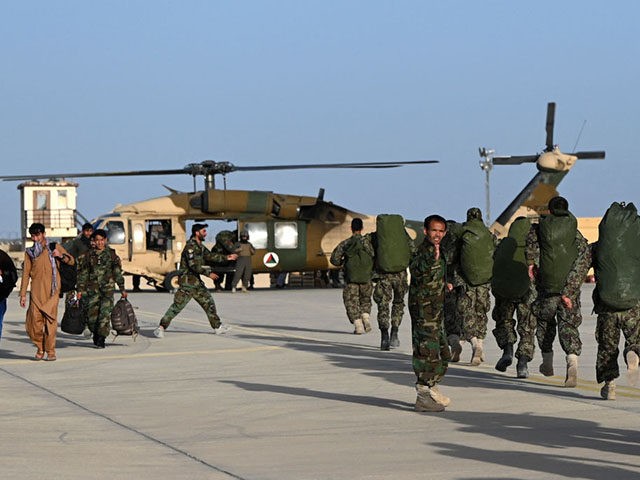Secretary of State Antony Blinken announced this week that the administration of President Joe Biden expects to immediately invest “nearly $300 million” in aid to Afghanistan, potentially just the beginning in what Blinken has advertised as heightened civilian engagement in the country.
Blinken has repeatedly stated this month that the United States would continue to be a “partner” with the Afghan government in rebuilding the country after two decades of war prompted by Washington’s invasion in 2001. Biden announced that he would extend the U.S. military presence in the country for at least another four months in a speech in April, stating he would not abide by the May 1 withdrawal deadline set by predecessor Donald Trump and instead withdraw all troops by September 11, the 20th anniversary of the al-Qaeda terrorist attacks that prompted the Afghan War.
“It’s time for American troops to come home,” Biden declared announcing the extension of America’s military presence in Afghanistan.
The Afghan news agency Khaama Press reported Thursday that Blinken expects a nearly $300 million donation to the Afghan government to be among the first post-military moves that Washington makes in the country.
“As part of our commitment to invest in and support the Afghan people, we are working with Congress to provide nearly $300 million in additional civilian assistance for Afghanistan in 2021 from both the Department of State and the United States Agency for International Development,” Blinken announced through his Twitter account. “This assistance, which we announced at the quadrennial donors’ conference in November 2020 as potentially being available at a future date, is being made available now to demonstrate our enduring support for the Afghan people.”
Khaama stated that the objective of the funds appeared to be “improving access to essential services for Afghan citizens, fighting corruption and narcotics, promoting economic growth, improving health and educational services, supporting women’s empowerment, facilitating human rights, strengthening Afghan civil society and independent media.”
Blinken did not address decades-old concerns regarding fund mismanagement in Afghanistan and the corruption of the government in Kabul. The United States Special Inspector General for Afghanistan Reconstruction (SIGAR), a watchdog agency founded to track American investments in the country, published a report in March finding over $2 billion in wasted, misused, or unaccounted for American taxpayers’ dollars in the country out of a total $7.8 billion analyzed in its latest report. Much of that money, the agency narrated, went into constructing buildings in the country that were no longer usable due to lack of maintenance, leaving them with “broken or leaky pipes, damaged bathroom fixtures, or blocked drains;” dangerous electrical wiring issues, or other infrastructure problems.
Other prior SIGAR reports found evidence of the U.S. wasting taxpayers’ dollars on big-ticket items such as unusable soccer stadiums.
Blinken’s announcement this week follows a visit to Kabul a week ago in which he met with Afghan President Ashraf Ghani to provide assurances that the United States was not leaving Afghanistan, merely withdrawing its troops.
“The reason I’m here … is to demonstrate literally, by our presence, that we have an enduring and ongoing commitment to Afghanistan,” Blinken said at a press conference in the Afghan capital. “Even when our troops come home, our partnership with Afghanistan will continue.”
Blinken also assured Ghani that America would continue to support Afghanistan’s “security and defense forces,” but not militarily.
Pentagon leaders have since suggested Biden’s commitment to an end to military engagement in the country may be flexible since Blinken’s visit to Kabul. This week, speaking to the House Armed Services Committee, the head of the Pentagon’s Central Command, Gen. Kenneth F. McKenzie, Jr., suggested troops leaving Afghanistan may not “come home,” as Biden suggested, but remain elsewhere in central Asia. He noted the Pentagon was engaging in “detailed planning” as to where the troops would go to make it possible for the U.S. military to respond to national security threats without a permanent presence in Afghanistan. Some reports have suggested countries like Tajikistan, Kazakhstan, or Uzbekistan as potential new homes for the departed American forces.
“While we will not stay involved in Afghanistan militarily, we will continue to support the government of Afghanistan and keep providing assistance to the ANDSF [Afghan armed forces],” McKenzie said.
McKenzie suggested Thursday that the entire Afghan military may collapse following the departure of U.S. forces. Prior to the 2001 invasion, the Taliban terrorist group ruled Afghanistan; the current Afghan government is in part a fabrication created during the war to replace the Taliban.
“I am concerned about the ability of the Afghan military to hold on after we leave, the ability of the Afghan Air Force to fly, in particular, after we remove the support for those aircraft,” McKenzie said at a separate hearing with the Senate Armed Services Committee. The Pentagon has reportedly allocated $4 billion a year to the Afghan security forces, which McKenzie warned was necessary funding.
“If we don’t provide them some support, they certainly will collapse,” he predicted.
Subsequent reports surfacing in U.S. mainstream media this week suggested that the Pentagon is requesting the deployment of an aircraft carrier to the region to supplement the U.S. presence in Asia following the scheduled military withdrawal from Afghanistan.

COMMENTS
Please let us know if you're having issues with commenting.